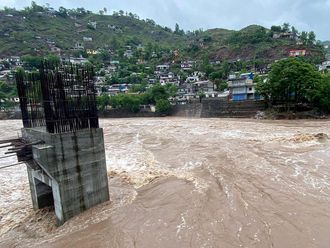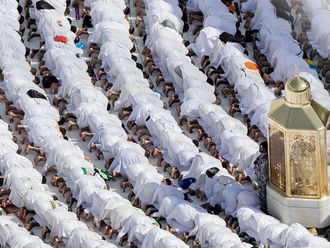As another Independence Day is about to be commemorated with fake sentiment and false speeches – we having honed the talent of turning national holidays into the most boring events imaginable – the toughest question our history throws up can no longer be shirked: if Pakistan was to be a country dedicated to permanent dictatorship, what was the point of it all?
Did we go through the blood-drenching and mass migration accompanying partition so that Pakistan should be a country dedicated to the permanent usurpation of power?
Was Pakistani independence meant to be a synonym for authoritarianism?
Tough questions
Harsh questions? Not if you consider the mess our history has been or, more to the point, if you consider our apparently unshakeable determination to keep making a mess of it.
Pakistan was created for the people of Pakistan. This at least is the orthodox line turned into cruel myth by the steady march of authority figures on the Pakistani stage, our consistent specialty, the extra-constitutional takeover. It bears branding into our collective consciousness that not a single peaceful transition of power marks the 57 tempestuous years of our history.
Yet, and savour the paradox, the bonds of nationhood (the sense of belonging to a nation) remain strong. Not because of Pakistan's rulers who constitute a dismal club but because of the Pakistani people, most of whom, although not all, have nowhere else to go, no place else to call home.
So is there still something that we can call the Pakistani dream? There is but in the minds of the poor and the defenceless, not in the passions or pocketbooks of the rich and well-placed who long ago made a virtue of swimming with the tide and, in the process, exchanging the power of hope and striving for the armour of an all-weather cynicism.
But to recap the usual factors held responsible for the founding of Pakistan, Islam was not in danger in pre-1947 India. Nor was democracy the issue because even if partition had not happened, India was getting democracy once the British left. The Indian Independence Act promised that.
So what was the compelling reason for the Muslims to insist upon a separate homeland especially when there was no going around the uncomfortable fact that, no matter how generously the frontiers of the new state were drawn, an uncomfortably large number of Muslims would remain in India?
The purpose of Pakistan, transcending anything to do with safeguarding Islam or promoting democracy, was to create conditions for the Muslims of India, or those who found themselves in the new state, to recreate the days of their lost glory.
After eight centuries of intermingling and assimilation the Muslim in India, however hard he clung to his historical memories, was no longer a Turk, a Persian or an Arab but something else: an Indian Muslim. And with the coming of the British, Muslims lost their pre-eminent status.
New organism
In a crucial sense, then, the Pakistan movement signaled a retreat from the heartland of empire to its outer edges, the final evacuation from Delhi and Agra to new centres of power in Punjab and Bengal. But even then it was for the new state, Pakistan, to create a historical justification for itself by emulating and rivalling, in achievement and glory, even if on a reduced scale, the success of its historical model, the Mughal Empire (in a 20th century setting, it goes without saying).
In other words, breaking away from India, for that's what partition did, the justification for Pakistan lay not in merely existing but in showing the spark, vitality and vigour of a new organism, like America to the old world, the breakaway part, in short, proving better in all that qualifies for civilised achievement than the erstwhile whole.
Against this scale of measurement how on earth do you place the kind of farce regularly staged in Pakistan: mediocre figures, meddling in politics when it is not their business to do so, adept neither at peace nor war, not understanding their own business or that of others, a succession of hopeless figures conspiring to make a mockery of a not-so-bad country? Mughal Empire indeed. Islamabad seems more like a replay of the last days of the Oudh dynasty.
The principal strengths of Muslim rule in the sub-continent were war, the consolidation of conquest, politics and administration. In all these fields Pakistan has not distinguished itself. Wars that should never have been fought started and then lost. About politics the less said the better.
It's not as if Pakistan lacked promise or potential. It did not. But it has been betrayed by its stars and a succession of cardboard figures who would have received short shrift at Akbar's court.
Is it all hopeless? Of course not. It's not too late to turn the ship around. But we'll have to go back to the drawing boards and, instead of taking Pakistan for granted which we often do, try to understand why this country was created. For rule by a few? To be lorded over by an oligarchy at once inept and corrupt, heedless of history and out of sync with the times? Come off it. Pakistan was meant for better things which it can still reach provided we stop making a mess of our politics.
– Ayaz Amir is a well-known columnist
Letter from Chakwal: What, then, was partition all about?
Letter from Chakwal: What, then, was partition all about?











